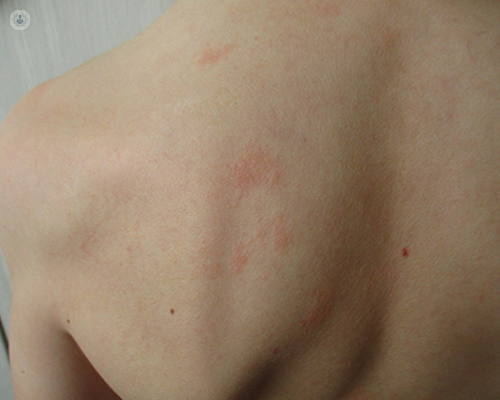Skin rashes: Causes, symptoms, and when to see a doctor
Escrito por:Skin rashes can cause concerns and discomfort. They are a common reason for visits to dermatologists and general practitioners alike. In this article, we'll explore what skin rashes are, their potential causes, and when it's important to seek medical advice.

What is a skin rash?
A skin rash refers to a noticeable alteration in the texture or colouration of your skin. It may appear as redness, bumps, scales, or blisters. Rashes may provoke itching, pain, or a burning sensation. They can occur on any part of the body and may be localised (limited to one area) or widespread.
Common causes of skin rashes
Skin rashes can have various causes, including:
Allergies: Reactions to certain foods, medications, or substances like latex.
Infections: Viral, bacterial, fungal, or parasitic infections can all lead to skin rashes.
Skin conditions: Conditions such as eczema (atopic dermatitis), psoriasis, and acne can cause persistent rashes.
Contact dermatitis: This occurs when your skin comes into contact with irritants or allergens.
Heat or sweat rash: Common in hot and humid weather, causing tiny red bumps and itching.
When to seek medical advice
While many rashes are mild and resolve on their own, some require medical attention:
Severe symptoms: If your rash is accompanied by fever, difficulty breathing, swelling of the face or throat, or severe pain, seek urgent medical help.
Worsening or spreading: If the rash is spreading rapidly or getting worse despite home treatments.
Painful or persistent: If the rash is painful, persistent, or interferes with daily activities.
Appearance of blisters: Blisters, especially if painful or oozing, may indicate a more serious underlying condition.
Associated symptoms: Symptoms such as headache, joint pain, or swollen lymph nodes alongside the rash may require evaluation by a healthcare professional.
Home care and remedies
For mild rashes, you can try these home care tips:
Cool compresses: Applying a cool, damp cloth to the rash can help reduce itching and inflammation.
Avoid scratching: It's important to refrain from scratching as it can exacerbate the rash and heighten the risk of infection.
Hydrate the skin: Use gentle moisturisers or emollients to keep the skin hydrated.
Identify triggers: Try to identify and avoid triggers that may be causing or exacerbating the rash.


